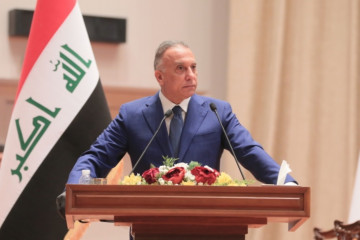

When Iraqi Prime Minister Mustafa Al-Kadhimi heads to Washington to meet US President Joe Biden at the end of July, he will be representing a country that is undergoing a transition from US to NATO-led forces, preparing for an upcoming election, playing a supporting role in US-Iran nuclear talks, and suffering from a struggling economy and infrastructure, exemplified by mass demonstrations over frequent power outages.
All the while, the US is in the middle of a large troop withdrawal in the Middle East and Central Asia as it pivots its foreign policy away from the region, shifting its focus to the Far East.
Troop withdrawal and a shifting focus
As the US continues its withdrawal from Iraq, the Biden administration is looking at the future of US foreign policy, which is focusing further east than Iraq and Iran, largely moving its attention to China and the Pacific.
In May, the US Department of Defence announced that it would be shifting funding to modernise the nuclear arsenal to deter China. Additionally, there will be more resources focused on the Arctic and outer space, according to the department's website.
"The Biden administration is dead serious about reducing the American commitment in the Middle East," Gordon Adams, professor emeritus at the School of International Service at American University, tells The New Arab. "Even the ratatat airstrikes on Iranian missiles in Iraq are not a precursor to a war or a re-engagement of the US military in large number. This is part of a bigger policy shift."
"As the US continues its withdrawal from Iraq, the Biden administration is looking at the future of US foreign policy, which is focusing further east than Iraq and Iran, largely moving its attention to China and the Pacific"
He traces this shift to former President Barack Obama, who intended to pivot to Asia, but got bogged down in the Middle East.
He says, "It was a pivot that never happened. He got dragged kicking and screaming into Gulf issues."
Despite this apparent pivot, the Biden administration has continued to bomb targets in Iraq, with retaliation from pro-Iranian militants. It is unclear if a US combat troop withdrawal will make a difference in these tit-for-tat bombings, given the US's widespread base presence and drone usage in the region.
US, Iraq, and Iran
As the US and Iran continue to renegotiate the Joint Comprehensive Plan of Action that the US left in 2018, Iraq appears to have an important indirect role to play with its relationship with both countries.
"The Iran deal is connected with security in Iraq." Deina Abdelkader, associate professor of political science at the University of Massachusetts Lowell, tells TNA.
"The Iraqi prime minister's objective is to balance his interests in relation to the Iranians and the Americans. Iraq often finds itself stuck in the middle"
In addition to the Iran deal, the US sees Iraq as an important intermediary between Iran and Saudi Arabia, which have seen a recent rapprochement following years of tension.
"The prime minister's objective is to balance his interests in relation to the Iranians and the Americans. Iraq often finds itself stuck in the middle," Bessma Momani, a senior fellow at the Centre for International Governance Innovation, tells TNA.
"We're seeing the Iraqis trying to play a more interlocutor role in politics. They're also reaching out to the Saudis. The prime minister might come to relay the message that Iraq is playing a useful role in the region."
The Iraqi economy
Even with the US shifting the focus of its troop presence away from the Middle East, arms sales from the US will likely remain influential.
"The economic importance for the US is no longer oil. It's arms sales," says Adams. "From the region's point of view, the US still makes the best kit. They can buy F35s, patriot missiles."
For Iraqis, oil remains an important source of revenue, while its domestic supply helps power the country's electricity. In recent days, widespread power outages have led to protests, as scorching summer temperatures have made a lack of air conditioning intolerable.
|
|
Iraq will likely request an increase in non-military aid during its meeting in Washington later this month.
"Iraqis would like to see American aid diversified, and not limited to the military," Abbas Kadhim, resident senior fellow and Iraq Initiative director at the Atlantic Council, tells TNA.
It will, however, be challenging for any aid to reach regular Iraqis, given the country's high level of corruption. Much of Iraq's infrastructure problems can be traced back to the US-led invasion. These days, some of its major power outages are linked to Iran.
Near-term objectives for both countries
With both countries seeing the other as helpful in achieving its objectives in the near future, the meeting will likely be fruitful. For Iraq, America's smooth military withdrawal is important for its security. For the US, this meeting comes at an inflexion point as it tries to reach a deal with Iran.
The true test of the meeting's success might not come until Iraq's upcoming elections, scheduled for October.
"The prime minister's requests are one thing, and Iraqi people's interests might be another," Abdelkader. "The elections are coming up. This could be a litmus test. He wants to survive."
Brooke Anderson is The New Arab's correspondent in Washington D.C., covering US and international politics, business and culture
Follow her on Twitter: @Brookethenews
![Iraqis demonstrate in Tahrir Square in central Baghdad against corruption and lack of services. [Getty]](/sites/default/files/styles/medium_16_9/public/2021-07/GettyImages-1028543874.jpg?h=199d8c1f&itok=G6J2pQ3-)




 Follow the Middle East's top stories in English at The New Arab on Google News
Follow the Middle East's top stories in English at The New Arab on Google News


